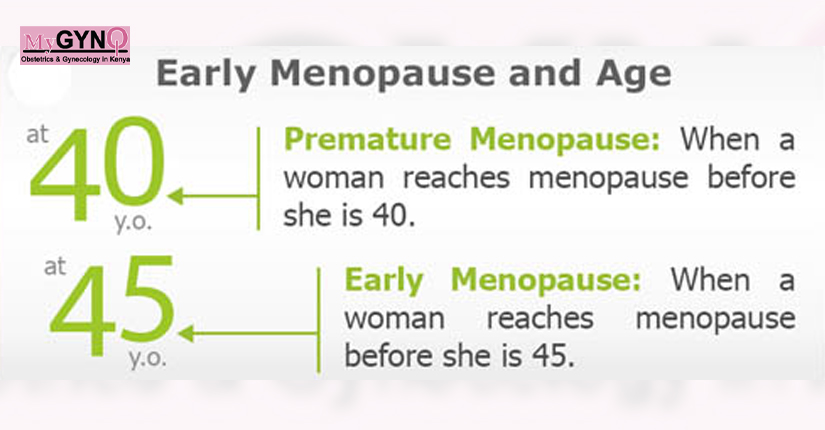- Clinic:
- 0733 945 717
- 0739 434 212

Uterine Fibroids
March 19, 2025
One baby at a time
April 4, 2025When menopause comes early

Menopause occurs when menstrual periods stop due to natural ovarian ageing. The average age of natural menopause is 51 years. When menopause comes early before the age of 40, this is termed as premature menopause or premature ovarian failure (POF).There is decreased activity in the ovaries, with little or no production of the female hormone estrogens. Menstrual periods therefore stop prematurely. But the ovaries may still produce some estrogens, and menstrual periods may return. Some women can even become pregnant after the diagnosis.
The most important thing is to try and maintain a certain level of hydration and feeding. Simple remedies can be tried first. Spreading out small and frequent feeds throughout the day adds up to a good amount capable of sustaining early pregnancy requirements. Remember to balance what you ingest, aiming to get adequate amounts of proteins, carbohydrates, vitamins and other micro-nutrients. Fluids are particularly important, as dangerous levels of dehydration can quickly set in on a background of nausea and vomiting. You should still continue taking the recommended pregnancy supplements.
Natural causes of premature menopause include: chromosomal defects (some parts of the female X chromosome may be missing); auto-immune diseases; or simply genetic predisposition to early menopause as seen in some families. Medical treatments like chemotherapy and radiotherapy can also damage the ovaries and cause premature failure. Surgical removal of the ovaries obviously leads to menopause right away, while hysterectomy (removal of the uterus) may predispose to menopause setting earlier than expected.
Missed periods are usually the first sign of early menopause. Later symptoms may be similar to those of natural menopause and include: irregular bleeding, mood swings and hot flashes (a sudden feeling of warmth that spreads to the upper body). In addition there is vaginal dryness (making sex uncomfortable), worsening of bladder control, sleeplessness and decreased sex drive. Most women with POF cannot get pregnant naturally. Fertility treatments may help a few, while others may require donor eggs to have children. There is no current treatment that will restore normal ovarian function.
Any woman under 40 years experiencing such symptoms should be assessed to determine whether they are undergoing premature menopause. A medical examination and tests will be required to make a diagnosis. The diagnosis is usually confirmed by a full female hormone profile. Some imaging studies may also be performed.
Women in premature menopause experience lowered estrogens levels. Low levels of estrogen can lead to changes in a woman's overall health and may increase her risk for certain medical conditions, such as osteoporosis and cardiovascular disease. Compared with women who go through natural menopause, women undergoing premature menopause spend a greater portion of their lives without the protective benefits of their own estrogen. This puts them at an even greater risk for menopause-related health problems.
The symptoms and health risks of premature menopause, as well as the emotional issues that may result from it, can be managed with the methods similar to those used for natural menopause. Estrogen hormone replacement is advised till the expected age of natural menopause. Additional beneficial lifestyle measures include: stopping smoking, physical exercise and,supplementary calcium and vitamin D. Psychological support is important for women diagnosed with premature menopause, as it is usually irreversible and has life-long consequences.
Take a fertility test today
